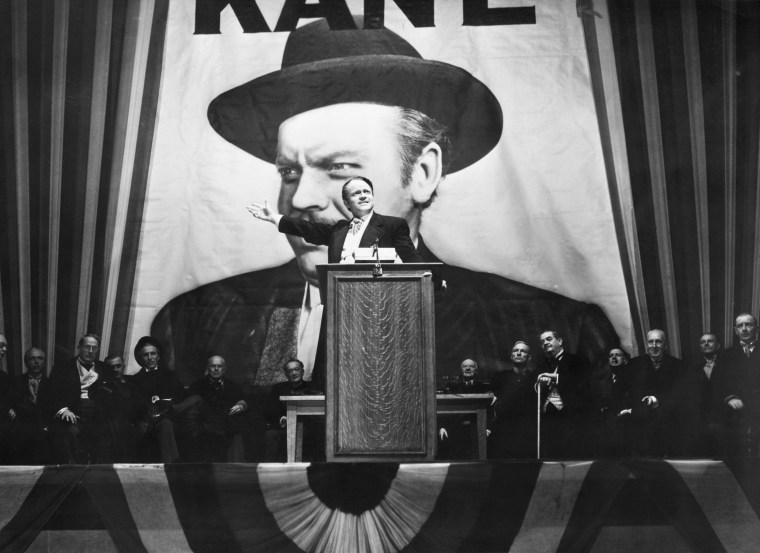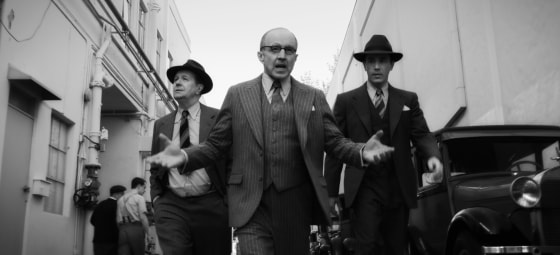The deception that powers the movies — and its uses and misuses — is at the heart of David Fincher’s “Mank,” premiering on screens this week and on Netflix in December. Directed from his late father Jack Fincher’s screenplay, it stars Gary Oldman as “Citizen Kane” screenwriter Herman J. Mankiewicz (the “Mank” of the excellent movie’s dreadful title), Ferdinand Kingsley as movie producer Irving Thalberg and Charles Dance as William Randolph Hearst — the inspiration for the titular Kane, of course.
But in the movie, Dance's Hearst is also a striking double for the News Corp's Rupert Murdoch, who (in the U.S. at least) is best known for owning Fox News. The characters all move in the same circle of conservative Hollywood power players, with Hearst as its king and Mank its charmingly addled court fool and token lefty.
The real-life Thalberg once observed that “a fair election is a contradiction in terms” — and he went to great trouble to make sure this was the case. In 1934, he produced a series of fake newsreels to be shown before MGM’s features, showing bankers and grandmothers proclaiming their support for California Republican gubernatorial candidate Frank Merriam while actors playing foreigners and other malcontents said in suspicious accents that they would vote for the challenger, author and socialist activist Upton Sinclair.
Hearst hated Sinclair, too, and didn't mind playing a little dirty, either; on Oct. 26 of that year, Hearst’s Los Angeles Examiner ran a photo of a boxcar loaded with apparent itinerant people, saying they had come to live off Sinclair’s "End Poverty in California" program; the people were actors, literally from Central Casting, paid for their work by the studios. It was a perfect synergy between Hollywood and the press, all in the service of a conspiracy to convince people they’d witnessed events that had never happened in order to frighten them into electing a conservative who would protect them.
The internet, for all its gifts, is a darkness more profound than the inside of any movie theater.
It’s a prescient film, especially considering the vintage of the screenplay — Jack Fincher died in 2003 — about the manipulations of press baron who won’t have any way but his.
“We have to be vigilant,” Mank tells Shelly Metcalf, his colleague, after watching Metcalf's faked man-on-the-street interviews for Thalberg’s propaganda newsreels. (Metcalf insists that no one of voting age would be dumb enough to believe the lies he’s telling.)
“In regards to?” Metcalf replies.
“People sitting in the dark,” Mank says, “willingly checking their disbelief at the door.”

Over the last four years it’s become apparent that the internet, for all its gifts, is a darkness more profound than the inside of any movie theater. It is both a map on a phone in our pocket and a stew of conspiracies, cruelties and rageaholics seeking an excuse to hurt someone. Out of that stew came our most recent era, and it’s hard to know what happens from here.
The 2020 election is over, and contra Thalberg, it seems both to have been pretty fair and to have yielded some kind of an end to the nightmare of the Trump campaign and presidency, in which an entertainer-turned-politician vampirized media attention without interruption for half a decade.
Plenty of us consume news as entertainment and come away with a sense of self-assurance but little understanding.
But the people who caused the mess are still around: Murdoch, Trump’s cheerleaders on contract at Fox News and a vast coterie of opinionators and anti-journalists on diffuse but wildly popular platforms like Twitter and YouTube who spent four years enthusiastically lying about everything from police violence to Covid-19. These new nexuses of entertainment and news are dangerous — but plenty of us consume news as entertainment and come away with a sense of self-assurance but little understanding of the world around us.
It’s a sad state of affairs, and if “Mank” has any reassurance to offer, it’s that this sort of thing is not new. As to what to do about mis- and disinformation, the Finchers have a compelling suggestion: Make a movie.
Mank sank his own teeth into the hand that fed him at tremendous personal cost — his poison-pen letter to Hearst, the Orson Welles-directed “Citizen Kane,” so offended his former patron that Hearst’s vast news holdings refused to either run advertising for or even mention it. He and others called “Kane” evidence of the filmmakers’ communist sympathies, and Welles landed on the infamous “Red Channels” list — a pamphlet listing 150 supposed anti-American communists published as a supplement to right-wing newsletter “Counterattack.”
In the end, that didn’t matter. “Citizen Kane” is universally considered one the greatest films ever made; its cultural footprint after 80 years rivals even the multimillionaire Hearst’s own. “Mank” swings for those same fences, and its perky script, remarkable performances and political savvy make it, if not a competitor to Welles’s masterpiece, at least a worthy companion to it.

